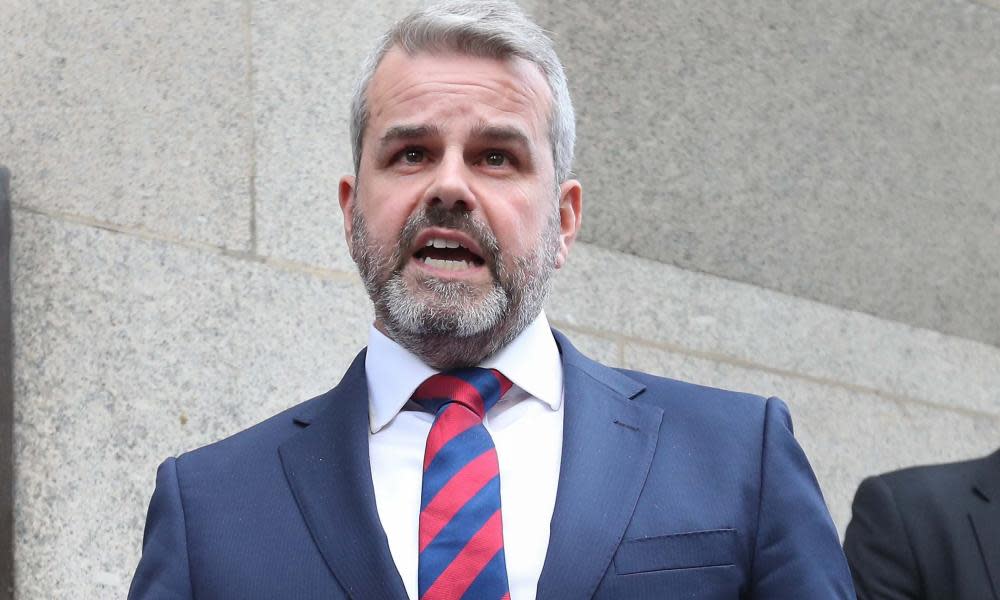Urgent review will look at introducing new road laws for cyclists

The government is to hold an urgent review examining whether there should be new road laws covering cyclists following the death of a pedestrian in London who was killed after being hit by a teenager riding a type of track bike that is illegal for road use.
The review, after the death of Kim Briggs, follows a campaign by her widower, Matthew. It will involve a subsequent and wider examination of what the Department for Transport calls “road safety issues relating to cycling”.
The announcement by the transport minister Jesse Norman follows the jailing of the teenager, Charlie Alliston, who collided with Briggs while riding a fixed-gear bike built for track use, which had no front brake and which was illegal on the road. Alliston struck the 44-year-old in February 2016 as she crossed a road in east London. He was convicted and sentenced to 18 months in a young offenders institution.
Cycle campaigners questioned why ministers were acting urgently over the case when they had delayed a promised review into all road traffic offences and sentencing for more than three years.
The former Olympic champion Chris Boardman, recently appointed by Andy Burnham to boost cycling and walking in Greater Manchester, said Norman’s approach should be “based on evidence, not headlines”.
In August, Alliston was cleared of manslaughter but found guilty of causing bodily harm by wanton and furious driving, a crime under the 1861 Offences Against the Person Act. After the conviction, Matthew Briggs met Norman to seek a law change to bring cyclists under the remit of existing legislation connected to dangerous driving and careless driving.
Briggs has argued that prosecutions are too difficult under the 1861 act, and that it does not include the option of a more serious charge when the actions of a cyclist cause a death.
In a statement released by the Department for Transport (DfT), Norman said it was necessary to make sure that road safety rules kept pace with the use of bikes. “We already have strict laws that ensure that drivers who put people’s lives at risk are punished but, given recent cases, it is only right for us to look at whether dangerous cyclists should face the same consequences. We’ve seen the devastation that reckless cycling and driving can cause, and this review will help safeguard both Britain’s cyclists and those who share the roads with them.”
The initial part of the process will report in the new year, the DfT statement said. A second phase will consider different ways in which safety can be further improved between cyclists, pedestrians and motorists, covering areas such as rules, public awareness and signs.
Briggs said he welcomed the announcement and thanked the government “for acting so swiftly”. He added: “I look forward to assisting the review in any way I can and hope very much that it leads to new legislation in due course.”
Of the 400 or so pedestrians killed on UK roads every year, about one or two on average are struck by bikes. Some campaigners have questioned whether there is an urgent need for a law specifically relating to cyclists given the rarity of such deaths. They also argue that the process would work best as part of a wider examination of road laws and their application, promised by the government in May 2014 but delayed.
Boardman’s mother, Carol, was killed after her bike was struck by a pick-up truck in July 2016; there has yet to be a decision over whether the driver should be prosecuted.
Boardman said: “Whilst I can empathise with Matt Briggs more than anyone, laws should be developed so the penalties are proportionate to the ability to cause harm. This means basing them on evidence not headlines. I’m all for tougher penalties if they lead to actual reduction in casualties on the road.”
Paul Tuohy, chief executive of the lobby group Cycling UK, said the group would work with the DfT “to ensure it focuses on evidenced ways that keep our most vulnerable road users safe, by addressing risks such as dangerous roads, drivers and vehicles”.
He added: “The proposed review of cycling offences needs to be carried out as part of the government’s promised wider review of all road-traffic offences and sentencing. This will ensure the justice system can deal with mistakes, carelessness, recklessness and deliberately dangerous behaviour by all road users.”

 Yahoo News
Yahoo News 
